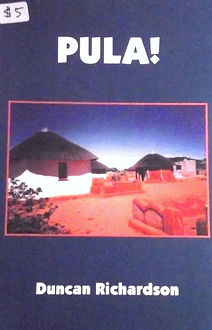

Pula! Duncan Richardson. Post Pressed, Teneriffe, Australia. 2007. 34 pp. ISBN 978 1 921214 19 6. AUS$12.50 + p&p
Reviewed by Patricia Prime
Duncan Richardson’s Pula! is a book-length haiku sequence based on the two years (1987-88) he spent as a teacher in Botswana. Richardson brings a contemporary feel to the form, with its brief prose passages linking the narrative. The book carries several photographs by Therese Sherley and Duncan Richardson and also has illustrations by the author.
The qualities of timelessness, poignancy and simplicity give Richardson’s haiku a sense of the strange life being lived by the poet during his stay in Botswana. Good haiku can be measured by the subtle way your mood changes as you read them, and these poems move us as they take us from arrival to departure. Whether memories are being evoked of the arrival in a foreign country as in “from the air / thatch huts and thorn trees / real after all” and “arriving in darkness / the motel greets us / with barbed wire and dogs”, or the sense of trepidation, dislocation and lost connection that can result from the first experience of a strange country as in “in the principal’s living room / a jackal in the distance / Mozart from his stereo” and “a new term / fifty faces fresh / from cattleposts”, Richardson seems able to convey the mood in just a few short lines.
Richardson’s sequence has many of the characteristics we appreciate in haiku” concise expression, clarity, sensory immediacy, an allusive quality of hinting at more than is directly stated, a preference for strong images, a lightness of touch and, importantly in this collection, the awareness of a different culture. For example, in the following two haiku we are aware of the difference in the children’s hairstyles and in their domestic rituals: “tight curled hair / ideal for keeping / pencils” and “after school breakfast / tin bowls drying / in thorn trees”.
In this sequence much of the author comes through: his obvious knowledge, interest in natural beauty, and awareness of the fragile circumstances in which the people live, are to the forefront. His love and respect for the people of Botswana shows strongly, as in this haiku:
fifteen and pregnant
shaved head
new term new luck?
His respect for the natural world often interfaces, sometimes sympathetically, sometimes less so, with the position in which he finds himself:
beneath the thorn tree
a rock pile and
two condoms
Often his haiku are simple in the best sense of the word and I particularly like “one of this / one of that / no need / for a shopping list” and “afraid of robbers / a neighbour keeps ready / a box of snakes”. Richardson’s haiku can strike an evocative and sometimes slightly enigmatic note as in “half crushed in the door / a ground cricket turns / and eats itself”. There is also a touch of humour and compassion in many of his poems:
unkempt bearded men
handcuffed to young constables
sometimes the roadblocks work
For me, the wildlife poems are a favourite: “elephants rustle / night bushies – dawn shows / cannon ball turds” and “beside the swimming pool / under the umbrella / relaxing / a warthog”.
The penultimate poem “end of year / desks and tables stacked / the blackboard crumbles” is a thought-provoking poem with which every teacher and pupil can empathise, although not with the last line where “the blackboard crumbles”. The final poem “last look back / thorn trees / and the new library” ends on a thoughtful note, as the poet takes a last look at his home for the past two years.
This book, attractively presented and of satisfying size, with one to three haiku to a page and around 64 haiku in total has clearly been sensitively written and is a fitting tribute to the poet’s time spent in Botswana.